Translate
Search
A Statement of Purpose and Function is required by the Children's Homes Regulations and Quality Standards (England) 2015 to indicate how a setting will provide individual care to children and to describe the ethos and aims of the setting.
A copy of this document is provided to Ofsted and a copy is available in the setting to be seen by:
Maples home is part of a range of services to support children with disabilities and their families. We provide overnight short breaks to children, both male and female from age 8 to 18 years, who have been diagnosed as having severe and complex learning and/or physical disabilities. We have three beds for planned short breaks and maintain a bed for an emergency placement to support families at a time of crisis. This would be in communication with social workers, parent/carer and the child to ensure the needs can be appropriately met.
We are open to planned short breaks for 352 days of the year, being closed on Bank Holidays and for a week over Christmas. Staffing is planned in advance to support any emergency admission during these closure periods.
The number of overnight stays per year allocated for each child is determined through a social care assessment. This allocation is divided equally over the year to support regular short breaks for our children and their families.
Children's needs are at the centre of our practice, and we carefully plan short breaks around the needs of children to ensure each has a positive stay with us. We use our knowledge of the children and their voice to place their welfare at the centre of our decision making. We are supported in this process by other relevant professionals, such as schools, health and social workers and working closely with families to ensure a consistent approach to meet the care needs of each child.
Our home is single storey, so all rooms are wheelchair accessible, as are all the outside areas that we can access for activities etc. We have overhead hoists in one bedroom and both bathrooms and also a mobile hoist to be used in any room of the home to accommodate those children who are non-ambulant, to ensure they are able to join in with every aspect of Maples community and events.
At Maples our purpose is to provide overnight short breaks to children from age 8 to 18 years, where they can feel safe and nurtured. They will experience time away from home, make friendships with others, build relationships and become part of our community. They will enjoy a range of experiences which will enable them to learn and develop skills appropriate to their age, ability and understanding. The team are committed to working holistically to involve everyone important in each child’s life to ensure the care and support we provide is consistent and meaningful.
Our aim is to provide an environment where children can feel safe to explore and develop as individuals. The staff team are experienced in adapting their way of working with each child, valuing their individual differences whilst maintaining a consistent approach to support and encouraging them to achieve independence, self-help skills and positive outcomes.
Maples currently has a team of 2 Lead Care Support Workers, 11 Care Support Workers, led by the Registered Homes Manager.
Maples ensures that it meets, and aims to exceed, standards set out in Children’s Home Regulations. Maples has an annual unannounced inspection through Ofsted and 12 visits through the year by an identified Independent person.
Daily planning ensures that activities support progress towards outcomes identified in the children’s EHCP (Education, Health and Care Plan) around the 4 key areas of: Communication and Interaction, SEMH, Sensory and Physical, cognitive development. The Key workers will work holistically alongside parents and professionals to create care plans which will include specific areas to support the childs growth and independence. These may have a focus relating to communication, promoting positive behaviour, developing independence skills.
Location
The Maples provision is situated in the grounds of St Bernard’s School in Louth, which is small market town in the foot of the Lincolnshire Wolds. We are in a residential area with housing to all sides, within a short walking distance of the town centre, which holds a market on Wednesday, Friday and Saturday and has many community activities and resources.
Facilities
Maples is located on the site of St Bernard’s School and consists of 5 bedrooms, a lounge, games/activity room, dining room, kitchen, a bathroom and hygiene suite. It is accessed through entrances to the front and rear.
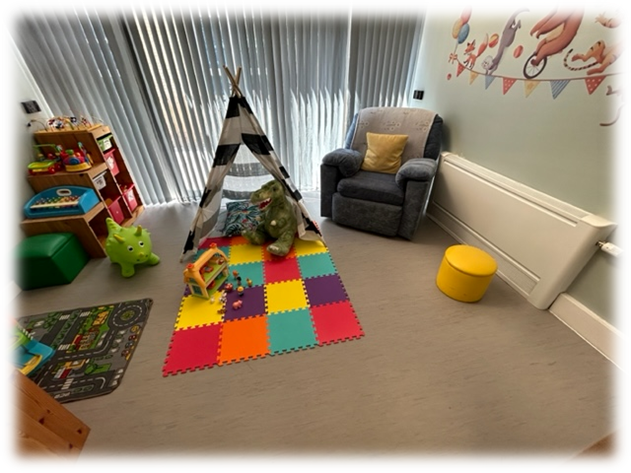
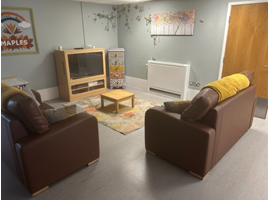
We have a lounge area with TV and DVD player, with a conservatory to the side with a range of toys and activities to access
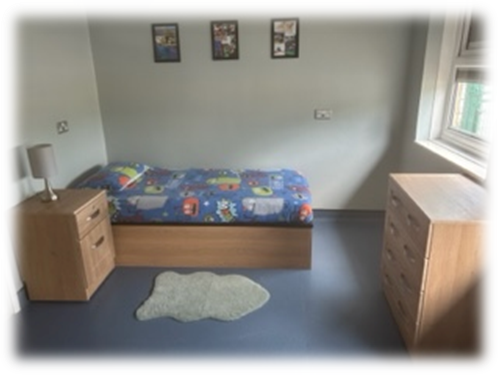
Each child will have their own room for the duration of their stay and are able to personalise with photos etc from home and from our selection of bedding, pictures and soft furnishings. Three rooms have profiling specialist beds, one has a ‘tough’ bed and one bedroom has an overhead hoist.
Rooms can have non-recording monitor fitted overnight to ensure a child’s safety, should they have medical conditions, such as Epilepsy. These are only used with signed parental consent.
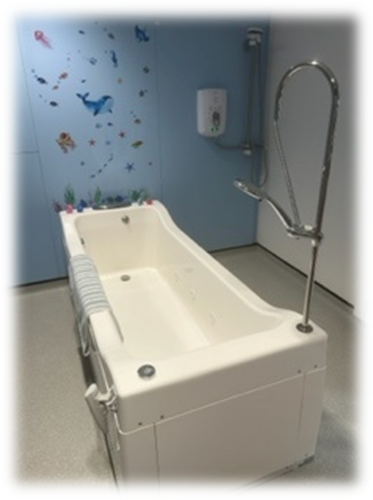
We have two bathrooms, both with overhead hoists. One with a specialist jacuzzi bath, the other being a full wet room with shower.
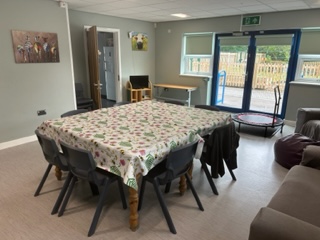
The dining room area is off the kitchen with tables, sofas and a TV/DVD player. This area is for eating, cooking, craft activities and an area to relax.
There are french doors to the enclosed outside area and a gate to access the large field including play equipment, a sensory area, a trim trail and a hard playground for ball games etc.
Although Maples is a self-contained home within the school grounds, we have access to the specialist rooms on site such as the swimming pool, sensory gym and light and sound room and all outside activity areas.
Maples has a small, tarmacked play area within the fence line, with room to provide activities such as water and sand play and other sensory activities, we also have go-carts to be used around the building. This also provides an area for picnics under a covered shade for sun protection.
Care Planning
Each child requires Care Planning documents completing before they are able to start their Short Breaks in Maples. This aims to record all information that the Maple staff team need to know to ensure the best possible stay for the child. This will include family information, the needs, likes and dislikes of the child and their daily routines, any medical requirements and behaviours. The Care planning process will involve the parents/carers, a member of the Maples care team, the Social Worker and any other professionals that are required. With parent/carer permission, we will also liaise with schools and other professionals where appropriate.
The voice of the child is always included in care planning. Were appropriate the child will always be included in the care planning meeting. Where the child is not able to attend, their voice will be included throughout the care planning process.
Child specific training is undertaken by the staff team at the point of need, for any individual requirements such as Gastrostomy feeds, and other medical interventions through the Specialist Nursing team. This also includes liaison with specialist therapists as required and program intervention is carried out by the staff team and recorded accordingly.
Administration of Medication
Staff are trained in the administration of medication and the safe handling of all medicines.
Only medication prescribed by a registered medical practitioner and labelled by a chemist with the child’s name and the amount/frequency of dosage will be accepted.
An agreement document is sent to parents/carers for them to complete and sign regarding the name and strength of the medication and the dose and frequency when given - this must correlate with the prescription label otherwise the medication is not able to be given.
Homely Remedies
A Home/Over the counter Remedies list is intended to meet a recognised need to treat minor ailments without necessarily consulting the child’s GP. Preparations listed for use as homely remedies will be sent in by parents if specifically requested and in this case, should be unopened, new packets with the child’s full name clearly written on. Dosage instructions should be clear, the date of purchase should be recorded, and all remedies stored in the locked medicine cabinet.
The use of home/over the counter remedies for the children in Maples should be similar to their use within a home setting. Homely remedies should be administered at the discretion of the Lead person on shift.
When a child commences Short Breaks at Maples, all staff should ensure that they are clear as to:
Any allergies the child has.
Any medication the child is taking.
Any reaction the child has had to medications.
Written consent should be sought from whomever has parental responsibility as to the administration of the identified homely remedies that the child may be given. This must include clear instructions as to how, when and how much medication should be given.
This consent should be alongside the MAR sheet and should be retained on the child’s file.
Administration of medication to the child must be safe, respectful and dignified. All procedures as identified in the ‘Safe Handling and Administration of Medications Policy’ must be followed.
Illness
Children who are unwell are advised to stay at home and not come into the home for their short breaks.
Should a child become ill whilst staying at Maples, parents will be contacted as soon as possible.
Emergency Anaphylaxis and Asthma Rescue Kit
Within Maples we have access to an Emergency Anaphylaxis Rescue Kit containing two Epipen adrenaline auto-injectors (AAI’s) for use in the event of a child experiencing anaphylactic shock and one salbutamol metered dose inhaler in the event of a child experiencing an asthma attack. These would only be used in and emergency situation with the written consent of parents/carers and, where the child is not prescribed their own AAI device or Asthma inhaler, they will only be administered under advice of the emergency services.
All staff will have training to administer an AAI and in the event of a child experiencing anaphylactic shock, the emergency services will be called.
Medical Provision
Whilst residing at Maples, children have an open-door access to:
Newmarket Medical Practice, Newmarket, Louth, Lincs Tel: 01507 603121
In the unlikely event of an emergency staff are to contact the emergency services on 999 and when possible to then contact parents/carers/Leads. All incidents are recorded by staff in line with homes policy and practice.
Maples staff undergo a rolling programme of basic First Aid and also specialist ‘First Aid at Work’ qualifications is required by the Leads.
Communication
In order to meet the varied communication needs of the children, staff in Maples support a total communicative environment, including utilising various forms of augmentative communication. This may be symbols, signing, objects of reference, switches and communication iPad’s.
Some children also carry a ‘Communication Passport’ which gives information to adults regarding the most effective way to communicate with them. Maples provides the means, reasons and opportunities to support communication in all its forms across a wide range of environments and contexts.
Personal Possessions
Children are encouraged to bring items (which are named) from home in order to feel emotionally safe and secure. Maples staff have protocols in place to ensure personal items are kept safe and fit for use, such as iPad’s brought in from home - these are locked in the medication room in between use and are accounted for at the start of shifts.
When children use their iPad’s these are also used through the Inspire internet to make sure that the correct restrictions are in place in line with internet safety.
Annual Review/CFP
Children who attend Maples through Short Term Breaks have a ‘Child and Family Planning’ meeting at least every six months, chaired by the Social Worker, which supports identification and progress towards, any unmet need. Maples staff will attend these meetings and supply a report of how the child has presented within the setting, what activities they have been offered, how many overnight short breaks they have attended and if there have been any reported incidents during their stays. Any child who attends the home has an annual review of their Education, Health and Care Plan. This includes the child, parents, any professionals involved including Maples.
Aims and Aspirations
In Maples we meet each child at their point of need and provide the support they need to be the best they can. We promote independence every step of the way, which is tailored to each child.
We have routines to support the children in being able to develop their independence, being away from home, supporting identified skills over time and also to have an understanding of routine and self-help skills.
Maples staff are pivotal in being part of the dialogue with parents and schools around ‘next steps’ and setting targets in line with their Social Care Assessment and EHCP.
Within Maples we cater for children with a variety of barriers to developing their skills. Our aim is to work with our children, alongside their families and other professionals to help to address these barriers with a great importance of equality and understanding discrimination and its impact part of our ethos.
Our aims:
Our equality objectives are:
The Voice of the child is recorded throughout each childs Short Break Stay within Maples and is promoted using the childs individual communication needs.
Should a child have a concern at any time they are free to approach any member of staff. All staff are aware of the individual child’s communication requirements in order to support their sharing of a concern. (PEC’s, iPads, verbal, written, etc)
The child’s voice is promoted, and they are actively encouraged to give feedback to the staff within Maples, at any time, as well as our other arranged visitors, including, the children’s Independent Advocate, the Trust visiting Trustee, or the Independent Person.
Voiceability provide an independent advocacy service. They have an identified visitor who comes into Maples every month to communicate and interact with the children. She is a familiar, consistent person that the children can communicate with and, if necessary, raise any concerns.
Voiceability headquarters can be contacted on 0300 303 1660
Email: helpline@voiceability.org.uk
Website: www.voiceability.org
All staff have accessed Mental Health First Aid training and support the children to express their any worries or concerns they may have.
Any concerns or questions raised by Children are then passed to the settings Manager so that they may address and act accordingly. If necessary, any concerns can also be passed to the family, Social Workers and CEO as appropriate.
The Manager will ensure that the child is aware that their concern has been noted and what actions are to be taken.
Children have to access Children’s Guide and the complaints procedures throughout their stay in Maples. These documents are reviewed regularly taken into account in Children’s comments.
Maples is a short break service, as such it remains parental responsibility to ensure their child receives an education. All children accessing the service have a current Education Health and Care Plan, which is reviewed on an annual basis.
Working with parents/carers and schools, Maples support the education arrangements in place to ensures a consistent approach in supporting the child. Maples work together with the childs allocated schools on behaviour strategies, communication methods and targets to be achieved. Maples staff will visit schools and observe children in their education environment where appropriate.
Maples will support education targets through Education Health and Care Plans and individual plans identified through the reviewing process and use these to set meaningful targets when the children attend their short breaks. The targets are set in conjunction with the child and their parents/carers views and wishes. Maples staff will attend Education Health and Care Plan reviews or contribute through reports, to school reviews.
Maples staff will ensure that the children are ready and prepared for school each morning, they will liaise with transport services to ensure each child’s transport is available to take them into school following their stays, and have regular communication with schools via communication books and telephone conversations.
Transitions and Independence
Maples encourages the development of self-confidence and allows children appropriate opportunities to take some calculated risks in their development. Such risks are clearly identified, agreed and assessed with the child and their parents or carers.
Maples will support and encourage children to be as independent as they are able, in activities of daily living, the level of support required will be identified through care planning and Education Health and Care Plans and is reviewed regularly.
Staff work with parents/carers, social workers and other significant people in the childs lives prior to them leaving our service at the age of 18 years. We will ensure all information, care planning etc. will be shared with as requested, to ensure and smooth transition into Adult Services and help them to move into the next chapter of their lives.
The children attending Maples for Short Breaks are provided with activities and opportunities appropriate for their needs and wants. We are able to offer activities both within the setting and trips into the community through walks and further afield with use of a minibus.
All activities are appropriately supervised, and risk assessed to take into account the needs and behaviours of the children and the activity. All venues are risk assessed, in addition to the mode of transport. We aim to provide as many opportunities and experiences as possible for the children accessing Maples.
We have a range of toys and equipment which stimulate fine and gross motor skill development, promote social identification, and encourage active participation. We also have many sensory based activities both inside and outside – the messier the better!
Arts and crafts activities are offered and encouraged within Maples and examples are displayed on boards within the setting. Subject to parental consent, photographs are taken of children engaged in activities which are also displayed in the setting, evidencing their participation and enjoyment. These photographs are kept in an individual memory book which the child/child takes with them when they leave the service.
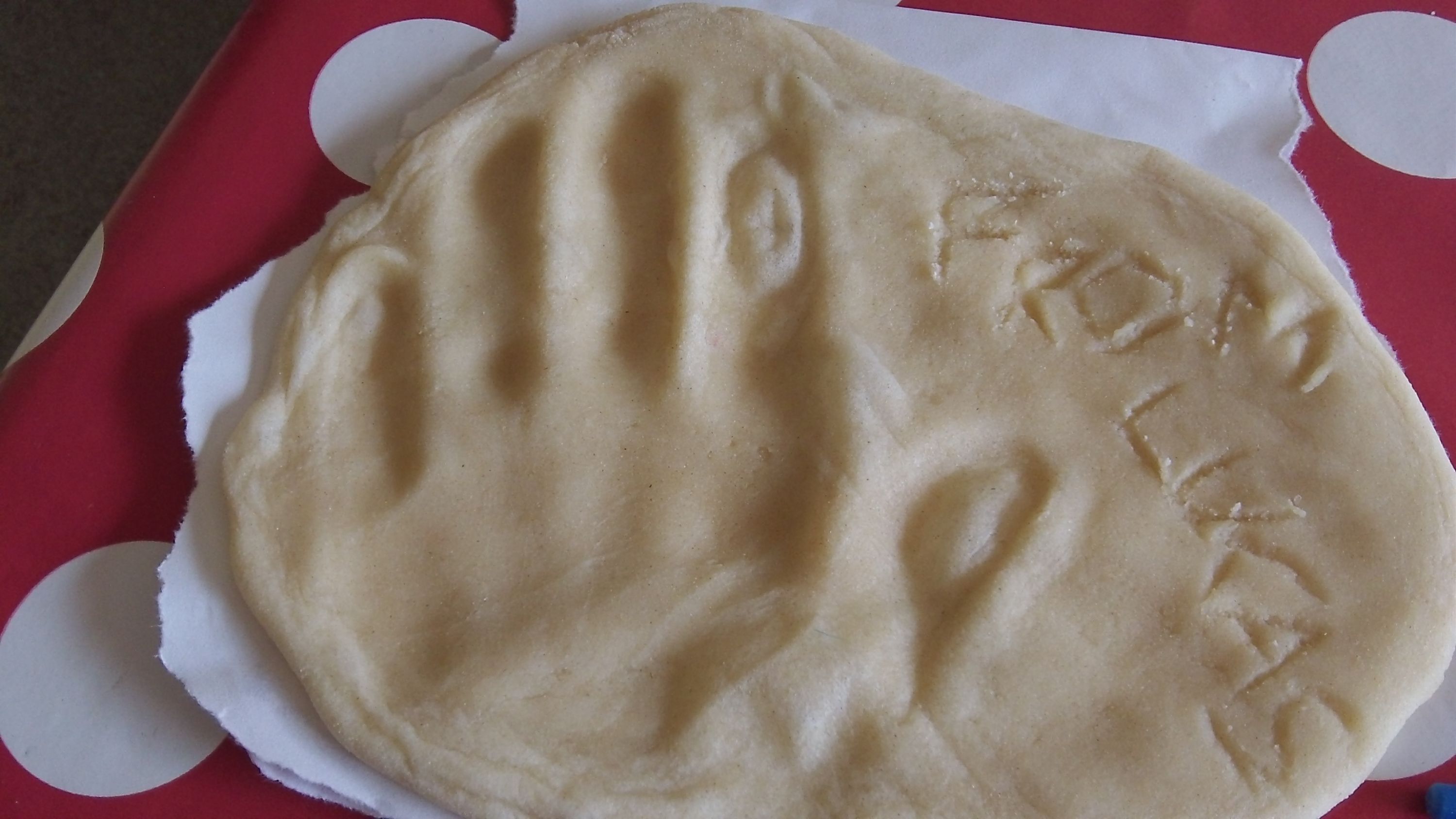
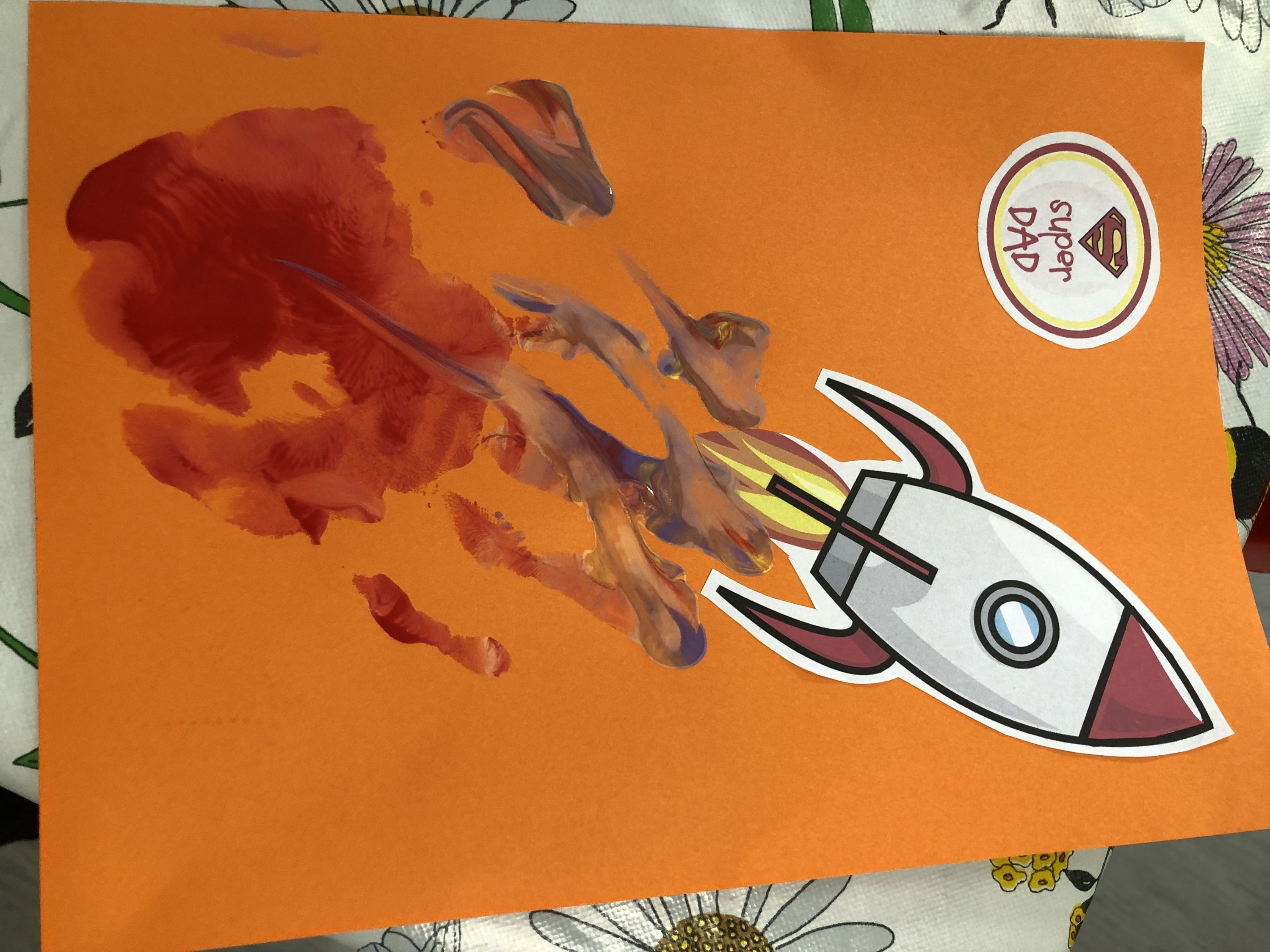
Independent living skills are promoted throughout a child’s stay at maples. This is done throughout a range of activites such as cooking, baking, making their own bed and washing their own items. This is to help build on self-confidence and support our children to their next steps in life.
Birthdays, special occasions, and any expressed religious observances, are celebrated with the children, and they will be encouraged and supported in these to experience and participate in broadening their socialisation and awareness of ethnicity and diversity. Any children with English as an additional language will be supported in accessing all aspects of the provision including the use of external support as required.
Our large outdoor areas provide many opportunities for safe exploration, use of a trim trail, go karts, zip wire and swings, engaging in sand and water play and sensory exploration.
We have access to the hydro pool within the school, supported by a qualified lifeguard and the staff team who will support in the water. The pool area has a light and sound system to enhance the experience and many floats and toys to play with. We have an overhead hoist to ensure all children are able to access the same opportunities. Activities within the pool encourage movement and sensory experiences.
Our ethos and culture is based on our three Cs of Connection, Community and Communication, This links directly into our relationships policy and how we work with our children.
We understand the importance of Mental Health and Wellbeing, and we aim to make it central to everything we do. We work to this aim through using a whole staff approach and specialised, targeted approaches aimed at vulnerable children.
To support this we have a positive mental health policy. This sets out what we are doing, why and how. If we have concerns then we follow a clear internal process.
Within Maples we have trained Mental Health First Aiders – both for our children (youth) and for our staff (adults).
These are some of our interventions that support the cognitive, communication and sensory needs of the children that access Maples.
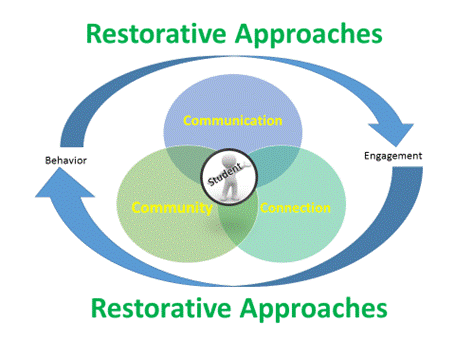
Restorative Approaches
We are part of a restorative trust, which means that we work with individuals to repair harm, strengthen relationships and find solutions, using our ‘One Team’ approach. We recognise that behaviour that communicates something isn’t right for a person, is likely to decrease through the development of supportive relationships. This is part of our overall approach in our setting because we understand when people feel supported, encouraged and engaged that they are more likely to achieve. We work to enable all of our community to grow and flourish. Our Positive Behaviour Support (PBS) is central to how we work.
Restorative practices are embedded within the federation. Staff receive ongoing training to support and extend their knowledge.
The Restorative Approach is a process that has a focus on promoting and strengthening interpersonal relationships and teaching social and emotional skills and knowledge. Behaviour management and student discipline models can be identified as Restorative when they take a preventative approach with the aim of strengthening relationships, and, when harm is done, a solution focused approach to repair it.
At Maples, we are committed to providing a warm, caring and safe environment for all our children so that they can learn and positively develop in a secure environment. We work from the basis of our Relationships Policy and recognise that all behaviour is communication. Reasons could be a sensory processing issue, hunger/thirst, not understanding what is happening, frustration, anxiety, and pain. Maples staff have a sound understanding of each child and consequently are able to alter the environment and stimuli in order to reduce possible triggers and support regulated behaviour.
All children have a right to be respected and valued, and have a responsibility to respect and value others, irrespective of their abilities. Staff aim to provide an environment, culture and opportunity for positive interactions and to help to build friendships and staff provide this by modelling respect and dignity for all.
As this is a short break service, the children live mainly with their parents/carers and there are no formal contact arrangements required. Where, on occasions, contact with a particular individual is not in the child’s best interests, we adhere to such requests from parents/carers. Any limits placed by courts on contact will also be strictly adhered to.
Parents/carers are welcome to contact the setting to receive a progress report on their child’s short break throughout their stay, or to discuss any aspect of their child’s care directly with the staff team. Staff provide a brief written summary of each child’s stay and parents/carers are encouraged to engage in this communication process.
Bullying of any kind is unacceptable and will not be tolerated. We take all incidents of bullying seriously. Please refer to the Anti-Bullying Policy.
Working with others
INSPIRE Connected Communities Trust as a whole, including Maples, embraces the ‘person centred’ ethos and takes the strengths and challenges each child has as a starting point for future positive outcomes. In addition to close working partnerships with parents, this often means other agencies and professionals are involved with developing a holistic approach to meet identified outcomes. Examples could include a communication iPad issued through SALT being used to support the child’s voice through choice making and commenting.
Safeguarding
As a setting with the INSPIRE Connected Communities Trust, we are committed to safeguarding and promoting the welfare and safety of all the children. All staff will demonstrate by their knowledge and actions that they share this commitment. All staff, volunteers, students, who enter the school are required to undertake an Enhanced DBS check. Any visitors need to show proof of this before they are able to enter the home.
The setting perimeter is secured with a fence and locked gates at all entrances and exits, to promote the security of the site and avoid the possibility of general public access. This security also supports the children’s safety.
Manager and residential leads follow safeguarding protocols and receive regular training through a rolling 6 year programme as defined by the LCSB (Lincolnshire Safeguarding Children’s Board) relating to signs and causes of abuse, radicalisation, e-safety, FGM and sexual exploitation. All residential staff complete annual mandatory Safeguarding Children training, along with The Prevent Duty, FGM, Online Safety, Preventing Bullying, Moving and Handling and Child Protection.
All Maples related polices can be found at www.InspireCCT.co.uk.
Maples is a secure building with fobbed external doors to prevent any unauthorised entry by people unknown to the staff team who may pose a risk to vulnerable children. The external grounds are also secure for the same reason.
We have a non-recording camera monitor placed in the corridor overnight, which has a view of the bedroom doors, this is monitored by the waking night staff so they are aware if any child leaves their room. This is to ensure that staff are always on hand to be able to fully support the child’s needs and that they are not able to enter another child’s bedroom.
When leaving the building to access the community, all children are accompanied by staff and a risk assessment will have been completed ensuring that all medication and equipment are taken as precautionary measures.
Within Maples we have a fully compliant fire alarm system which is regularly tested and recorded. Fire drills are completed and recorded monthly.
Regular inspections are made of all further fire safety equipment, including the emergency lighting system and fire blankets. All fire alarm systems are checked and serviced regularly by specialist providers.
Children have an individual fire risk assessment (Personal Emergency Evacuation Plan – PEEP) which states their likely responses to the alarm and the evacuation strategy. Evacuation sheets are attached to mattresses for the safe evacuation of children who are wheelchair-dependent, in the event there is a power cut and hoists are non - operational.
During induction, new staff are made aware of the procedure if a fire should occur and evacuation plans for both day and night time evacuations, are displayed in the setting including the evacuation points.
Where a child or child is known to have the potential to go missing whilst out in the community, additional safeguards are put in place which may include discussions with the local police, specific risk assessments and agreed protocols. This follows the Joint Agency Protocol for Children Missing from Care in Lincolnshire. In the highly unlikely event that a child should go missing from Maples, the police and parents/carers will be alerted immediately, and additional staff will be called in to assist in a search.
Each child has their own risk assessment which is reviewed and monitored as part of the care planning and review process and as new behaviours or risks are identified and a Positive Behaviour Support plan in place.
Positive Behaviour Support
At INSPIRE Connected Communities Trust and within Maples, we believe that strong relationships between staff and children are central to our work. Connection, Communication and Community are important anchor points in our practice, as these work together to enable our children to feel safe, valued and secure. We will take a strength-based approach and work holistically to develop our children’s resilience and independence. We have high expectations of our entire community and offer equal support and challenge to develop and maintain this. Staff must be fair and adopt an approach of ‘flexible consistency’ in support of all children. Being ‘Fair’ is not about everyone getting the same (Equality) but about everyone getting what they need (Equity).
Our positive behaviour support is about meeting our children at their point of need, maintaining dignity, protecting relationships and promoting self-esteem. We do this through working from a non-abusive psychological and physical intervention approach (NAPPI) and restorative practice.
Our policy links directly to the PBS paperwork that is informed by our training (www.nappiuk.com). Through this we have consciously moved to relational practice that is on purpose, by design and in keeping with our values as an organisation. We recognise that at times we may need to intervene physically to ensure the safety and wellbeing of the child, others within the Maples community or to protect the fabric of the building from serious damage which could cause a risk.
All physical interventions will be carried out by specifically trained staff and are recorded using the PBS documentation recording system, all staff access PBS training at least annually and in line with any change in need to the child. Parents/carers will always be informed of any physical intervention. Staff will always reflect on their practice and on the positive support plan for that individual. Children will always be offered an opportunity to debrief as part of our restorative practice. Any physical intervention will be the last resort after de-escalation and diffusion options have been exhausted. Staff with the strongest relationships will be in the position to support with any intervention and only after training, agreed risk assessments. Each child will have a Positive behaviour support plan which details how to recognise and support with increased levels of distress with appropriate strategies, risk assessments and scripted interventions, where required.
We work with natural consequences e.g., if you are hurting others we need to keep you and them safe.
“We will not impose arbitrary consequences onto children for poor behaviour, instead we will work to meet need and repair harm through restorative practice. Whatever we choose to do it needs to be about working towards ‘changing a behaviour, restoring a relationship or fixing a problem and it needs to link logically to the initial incident” (Whitaker, 2021).
The consistent approach that is taken by adults encourages our children to understand that their behaviour and actions always impact upon others and as a result will have a response associated with this. Regular reminders of ‘Ready, Respect, Safe’ are to be used as a non- confrontational approach to addressing behaviours that challenge. We will look for the ‘Logical response’ which will be reasonable, fair and necessary. Working in this way allows a logical response to a conflict incident which is fair and delivered with a restorative emphasis, so that relationships remain intact.
(Read in conjunction with Relationships Policy)
Children Rights
Children who access Maples have the right to feel safe and listened to. They have the right to know that their feeling and views are heard and acted upon, and that their health and wellbeing is our priority.
If a child or their family feel something it not working with any aspects of their care in Maples, the team would like to be able to deal with this informally wherever possible and will always endeavour to rectify any issues promptly. However, where this is not possible, children and their families need to be made aware of the complaints procedures. Staff will be on hand to help with the complaints where necessary.
If a child would like to make a complaint and requires help from an independent person, Voiceability Advocacy Service can help with this process.
Maples Residential is a Lincolnshire County Council commissioned Short Term Breaks service at:
INSPIRE Connected Communities Trust, St Bernards School, Wood Lane, Louth, Lincs., LN11 8RS.
Responsible Individual:
Lea Mason, CEO.
INSPIRE Connected Communities Trust, St Bernards School, Wood Lane, Louth, Lincs LN11 8RS
Tel: 01507 603776
Registered Homes Manager at Maples Residential:
Suzanne Hogg.
Maples Residential, St Bernards School, Wood Lane, Louth, Lincs., LN11 8RS
Tel: 01507 603776 Ext 3
Staffing Structure
The Maples staff team, employed by Inspire Connected Community Trust, consists of the Registered Homes Manager, a Deputy Manager, a Lead Residential Support Worker and 11 Residential Support Workers.
Staff within Maples work as Residential Support Workers, these are specific to working in Maples and staff work on day and waking night shifts.
All staff are qualified to level 3 qualification or working towards this. Maples staff are subject to safer recruitment process and the Enhanced Disclosure and Barring Service clearance (DBS) which is carried out every 3 years.
Details of staff qualifications and experience are available, including that of the setting Manager.
We have a bank of experienced relief Residential Support Workers who can be called upon to cover shifts as required.
Maples is staffed both day and night. There are at least two members of staff on duty during the day shifts of morning and afternoons, dependent upon the number and levels of needs of the children. A shift leader is identified on the rota to take responsibility for running each shift. At night, there are two staff on waking nights. Where a child’s care needs are high, particularly during the night, there will be an additional member of staff to support.
On occasions where safe staffing levels cannot be maintained, parents/carers will be contacted and short breaks cancelled, sometimes at short notice. We always endeavour to repay the short break at a later date.
Staff are encouraged to be involved in their own personal development. The process includes:-
Training and Supervisions
Staff meetings and group staff supervision - within Maples we hold monthly staff meetings which follow an agenda and are an opportunity for staff to voice their opinions, to discuss any relevant matters and to have time to reflect on practice so we can become a more effective staff team.
Working as part of a team under specific areas of responsibility (Champions).
Key working and joint working with colleagues within the team.
Joint working with other professionals and agencies.
Supervisions
Additional duties and responsibilities which are delegated to staff as they become more skilled and competent within the team which encourage staff strengths and values
Staff supervisions are an integral and necessary tool for the effective and safe delivery of services to children. Individual one-to-one supervisions take place bi-monthly with the Lead Support Workers. This provides an opportunity for discussion on relevant issues relating to the role, the setting and the children, such as training needs. This also gives staff the chance to reflect on their own practice in order to improve and grow within their roles. Performance Management meetings take place annually with Manager. This is linked to defined professional outcomes.
Staff undertake mandatory training every year, as scheduled in our training plan. In addition to this they will undertake specialist training to ensure we meet the needs of both the staff and the children we support, comprising of both elearning courses and face-to-face training.
Staff can request and are encouraged to undertake additional relevant training for their Continuing Professional Development to enhance their abilities, this is also reflected in their annual PLJ reviews, where staff will set targets to achieve over the year.
All contracted staff will have completed, or be working towards, a relevant Level 3 qualification.
Induction
All new members of staff are required to complete a detailed induction programme over a 6 month probationary period. This includes:
A range of mandatory online training relating to safeguarding, child protection and Health and Safety areas such as fire safety, manual handling and stress management.
Information to support wellbeing, for example, access to employee assistance packages, benefits packages along with opportunities to access coaching support and development.
All staff are expected to maintain a professional development portfolio, which details their qualifications and training, as well as their agreed development targets for the following year. These targets are set at their annual appraisal meeting.
Training and development opportunities will be provided for a minimum of six paid days per year, for each staff member. This includes accessing E-Learning packages, mandatory training and CPD opportunities.